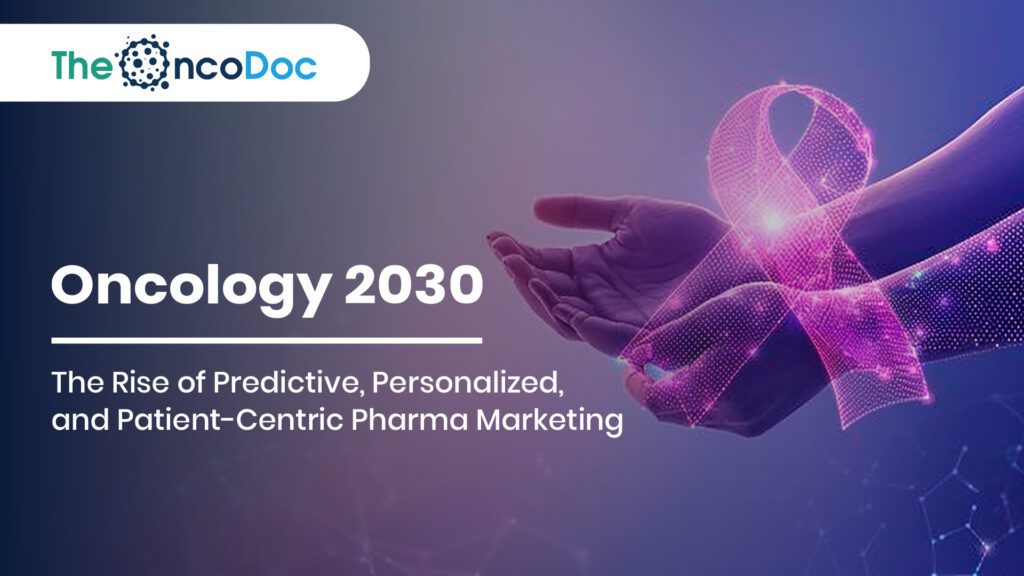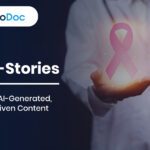Introduction: The Dawn of a Fully AI-Integrated Oncology Pharma Era
By 2030, oncology pharma marketing will no longer be about fragmented campaigns or isolated digital tools. Instead, artificial intelligence (AI) will act as the foundational operating system that powers every decision, campaign, and interaction. AI will not simply automate repetitive tasks but will elevate oncology marketing into a proactive, predictive, and deeply empathetic discipline, where human creativity merges seamlessly with algorithmic precision.
This future ecosystem is designed with a singular goal: improving patient outcomes while streamlining commercialization strategies. Pharma companies will harness predictive analytics, generative AI, real-world evidence (RWE), and hyper-personalization to create meaningful, measurable change in cancer care.
1. Predictive Intelligence as the Strategic Brain
AI will function as the “central nervous system” of oncology marketing. Predictive intelligence will anticipate shifts in market trends, identify rising patient populations, and forecast physician prescribing behaviors.
- Key Applications:
- Detecting regional surges in rare cancers and planning early outreach campaigns.
- Mapping HCP prescribing behavior to forecast treatment adoption rates.
- Optimizing resource allocation by predicting ROI of marketing efforts before launch.

2. Hyper-Personalized Omnichannel Engagement
The future of oncology marketing lies in patient and HCP journeys that are continuously optimized in real-time. Instead of broad campaigns, AI will ensure every interaction is contextually relevant.
- Features:
- Messages tailored to a patient’s diagnosis stage or emotional state.
- Dynamic HCP dashboards showcasing therapy recommendations based on local clinical data.
- Seamless integration of mobile, voice, and in-clinic experiences.
By leveraging micro-moments, critical emotional and clinical decision points, pharma brands will become trusted health allies rather than advertisers.
3. Generative AI for Content and Compliance
Generative AI will become a content production powerhouse, capable of delivering thousands of compliant, emotionally resonant assets in minutes.
- AI-generated campaigns will include:
- Patient education kits in vernacular languages.
- Scientific briefs with embedded evidence-based recommendations for HCPs.
- Real-time content revisions through automated Medical-Legal-Review (MLR) systems.
By integrating compliance algorithms directly into content creation tools, pharma marketers will cut content approval times by over 70%, significantly accelerating time-to-market.
4. Real-World Evidence (RWE) as a Marketing Asset
By 2030, RWE will be more than a scientific tool; it will become the centerpiece of oncology brand narratives.
- AI will unify data from:
- Wearable devices tracking treatment adherence.
- Genomic sequencing platforms offering precision medicine insights.
- Hospital electronic health records (EHRs) providing survival and quality-of-life data.
Pharma marketers will create dynamic dashboards that demonstrate not just clinical efficacy, but real-world patient impact, helping payers, physicians, and patients make confident decisions.
5. Ethical AI Governance
The future of oncology pharma marketing will depend on transparent AI ethics frameworks:
- Algorithms must be trained on diverse patient datasets to prevent bias.
- Content will clearly indicate its AI-assisted origin, building trust and transparency.
- Dedicated AI ethics committees will ensure fairness and accountability across campaigns.
6. Strategic Co-Pilot, Not Data Analyst
Marketers will transition from data crunching to strategic orchestration.
- An AI “co-pilot” will deliver real-time oncology insights.
- Marketers will query conversational dashboards instead of compiling manual reports:
“Show me regions with a rise in HER2+ breast cancer and local influencers with the most engagement in oncology discussions.”
The system will instantly provide actionable insights, freeing human creativity for brand vision and ethical oversight.
7. From Mass Campaigns to Micro-Segmentation
Hyper-local and hyper-targeted campaigns will replace traditional marketing. AI will:
- Identify HCP content preferences (podcasts, infographics, or data-heavy briefs).
- Create patient outreach programs that take socioeconomic realities and cultural sensitivity into account.
- Tailor campaigns for caregivers, integrating emotional well-being support.
This segmentation will deliver significantly higher engagement rates and reduce wasted ad spend.
8. Generative Content Foundries
In 2030, pharma teams won’t “write” campaigns; they’ll design content parameters:
- Marketers set creative briefs as inputs (audience type, disease stage, emotional tone).
- AI instantly delivers:
- Social posts for patients.
- Slide decks for oncologists.
- Visual abstracts for researchers.
All assets will come pre-reviewed for compliance, reducing the review cycle to hours.
9. Ethical Oversight as a Core Marketing Function
The marketer of 2030 will act as an ethical watchdog:
- Evaluating algorithmic transparency.
- Ensuring campaigns reflect diversity and avoid emotional manipulation.
- Reinforcing patient trust by highlighting AI’s supportive, not manipulative, role.
Credibility and trust become the main brand currency as a result of this change.
10. Patients: Personalized Care Journeys
AI will curate empathetic, personalized oncology education.
Patients will experience:
- Early alerts based on genetic predisposition or wearable health signals.
- Emotionally intelligent messaging that adapts to patient sentiment and treatment stage.
- Peer-driven community support recommendations, facilitated by AI sentiment analysis.
This will create better adherence, mental health support, and confidence in treatment decisions.
11. Healthcare Professionals (HCPs): Evidence at Fingertips
By 2030, oncologists will rely on AI-powered virtual assistants:
- Summarizing new clinical trial data in seconds.
- Providing decision support systems tailored to their specialty.
- Offering real-time comparative therapy dashboards for complex cases.

12. Pharma Companies: Efficiency and ROI
Pharma companies will witness a paradigm shift:
- Time-to-market for oncology drugs will shorten as AI streamlines approval workflows.
- Marketing teams will allocate resources dynamically based on predictive ROI analysis.
- Brand value will increasingly be tied to data transparency and measurable patient outcomes.
13. Payers: Data-Backed Confidence
AI-driven RWE will empower payers to:
- Approve therapies based on live treatment efficacy dashboards.
- Negotiate value-based pricing models with pharma companies.
- Identify and fund preventive oncology strategies for high-risk populations.
14. The Ecosystem: A Shared AI Infrastructure
A fully AI-integrated oncology ecosystem will thrive on data collaboration:
- Hospitals, pharma, NGOs, and governments will share anonymized data streams.
- AI will transform siloed datasets into a global oncology intelligence network, accelerating innovation and equity in cancer care.
15. Digital Twins for Personalized Oncology Pathways
By 2030, digital twin technology will become a cornerstone of personalized oncology care, offering precise simulations of a patient’s unique biology and cancer progression.
- Oncologists will use these virtual patient replicas to preview therapy outcomes, enabling evidence-based treatment decisions with greater confidence.
- They will experiment with drug combinations virtually, identifying the most effective and least toxic options before clinical application.
- This level of predictive modeling will help doctors design hyper-personalized care plans tailored to each patient’s genetics, lifestyle, and response patterns.
For pharma marketers, digital twins represent a powerful storytelling tool. Campaigns will feature clear, visually engaging educational content that simplifies complex therapies, helping patients and caregivers understand treatment benefits and potential risks. This approach bridges the knowledge gap, builds trust, and empowers patients, positioning brands as not just drug providers but also partners in precision medicine and informed care journeys.
16. AI-Powered Virtual Communities
By 2030, oncology support networks will evolve into AI-driven virtual communities that deliver personalized support and valuable insights.
- Adaptive chatbots will offer real-time emotional guidance, symptom advice, and treatment information, ensuring patients feel supported 24/7.
- Survivor-patient matching algorithms will connect individuals based on shared experiences, creating meaningful mentorship and reducing isolation.
- These groups will also serve as dynamic platforms for market research, gathering real-time input to improve advertising and pinpoint new patient need.
This integration of AI will create safe, empathetic spaces where patients, caregivers, and survivors collaborate, while empowering pharma marketers with authentic, data-backed engagement strategies.
17. AR/VR for Immersive Stakeholder Engagement
By 2030, AR/VR technologies will revolutionize oncology engagement strategies for all stakeholders.
- Oncologists will undergo hands-on training using realistic 3D tumor models, improving diagnostic and surgical precision.
- Patients will experience virtual treatment journeys, reducing anxiety by visualizing each step of care in a safe, guided environment.
- Pharma brands will leverage immersive technology at global conferences to demonstrate molecular-level therapy mechanisms, fostering deeper scientific understanding.
These tools will bridge the gap between complex science and human connection, creating engaging, empathetic, and evidence-driven experiences that strengthen trust among patients, physicians, and industry leaders.
18. Blockchain for Marketing Transparency
Blockchain technology will be essential to establishing credibility in oncology marketing by 2030.
- It will enable tamper-proof verification of clinical trial results, campaign claims, and educational content, ensuring credibility at every level.
- Secure, patient-consented data sharing will protect privacy while empowering patients to control how their information is used.
- Pharma companies will provide transparent ROI reporting for payers and investors, showcasing measurable impact.
Blockchain will transform oncology marketing into an auditable ecosystem where transparency is standard, trust becomes a measurable metric, and ethical engagement is a key competitive differentiator.
19. Advanced Sentiment and Emotion Analytics
AI sentiment analysis will evolve into neuro-emotion analytics, tracking:
- Facial expressions during campaign testing.
- Micro-emotional cues in patient feedback videos.
- Audience reactions to different storytelling approaches.

20. Automation Beyond Marketing: Integrated Care Delivery
AI-powered marketing in oncology will evolve into a fully integrated care delivery system.
- Automated reminders through connected wearables will keep patients on track with appointments, medication schedules, and wellness goals.
- Predictive alerts for oncologists will flag therapy non-adherence risks or early signs of complications, enabling timely interventions.
- Marketing insights will directly feed into electronic health records (EHRs) and clinical workflows, allowing for a unified, data-driven approach to patient management.
This seamless blend of marketing intelligence and care delivery ensures proactive support, strengthens patient adherence, and transforms oncology marketing into a life-improving healthcare tool.
21. Redefining KPIs
By 2030, oncology marketing success will be measured by meaningful health outcomes rather than vanity metrics like clicks or impressions.
- Treatment initiation rates will serve as a key benchmark, reflecting how effectively campaigns encourage timely diagnosis and therapy adoption.
- Quality-of-life metrics will evaluate the broader impact of oncology interventions, considering patient well-being, mental health, and treatment adherence.
- Community-driven trust scores will highlight the role of transparency and ethical communication in building lasting credibility.
With oncology pharmaceutical marketing closely aligned with patient outcomes and long-term value, this evolution in KPIs signifies a fundamental move toward responsibility.
22. AI Democratization
Pharma firms will adopt AI democratization by 2030 in order to close the worldwide cancer care gaps.
- Open-source AI models will be made accessible to low-resource clinics in emerging economies, supporting early detection and personalized treatment planning.
- Patient-led advocacy groups will leverage these tools to raise awareness, improve education, and empower communities.
- Academic oncology researchers will gain free access to advanced AI algorithms, accelerating innovation and drug development.
This democratization initiative will drive equity, ensuring patients worldwide benefit from cutting-edge oncology technology regardless of geography, resources, or socio-economic barriers, transforming cancer care into a truly inclusive ecosystem.
23. Human Creativity + AI Precision
Despite AI’s dominance, human ingenuity remains irreplaceable. Creative directors will focus on:
- Emotional storytelling frameworks.
- Campaign ethics.
- Cultural sensitivity in global oncology marketing.
24. Toward Predictive, Preventive, and Participatory Oncology
The future of oncology is anchored in P4 medicine, Predictive, Preventive, Personalized, and Participatory.
- Pharma companies will use advanced AI models to forecast cancer incidence years in advance, enabling early interventions.
- AI-powered awareness campaigns will drive prevention by identifying at-risk populations and promoting proactive health behaviors.
- Every interaction will be personalized, from diagnosis to survivorship support, ensuring patients feel seen and understood.
- Patients will be empowered as active decision-makers, participating in treatment choices and wellness planning.
This holistic approach transforms oncology care from reactive treatment to a future-proof, patient-centric, and data-driven ecosystem.
Conclusion: Oncology Marketing as a Lifesaving Discipline
By 2030, oncology pharma marketing will be more than a business function, it will be a critical component of healthcare delivery. AI will not replace marketers but elevate their roles as strategists, ethicists, and storytellers. Companies that embrace data transparency, cultural empathy, and hyper-personalized engagement will set the standard for this new era.
The convergence of AI, blockchain, RWE, and emotional intelligence will accelerate equitable cancer care globally. The winners in this ecosystem won’t be those with the biggest budgets, but those who measure success by the number of lives saved and improved.
The Oncodoc team is a group of passionate healthcare and marketing professionals dedicated to delivering accurate, engaging, and impactful content. With expertise across medical research, digital strategy, and clinical communication, the team focuses on empowering healthcare professionals and patients alike. Through evidence-based insights and innovative storytelling, Hidoc aims to bridge the gap between medicine and digital engagement, promoting wellness and informed decision-making.



